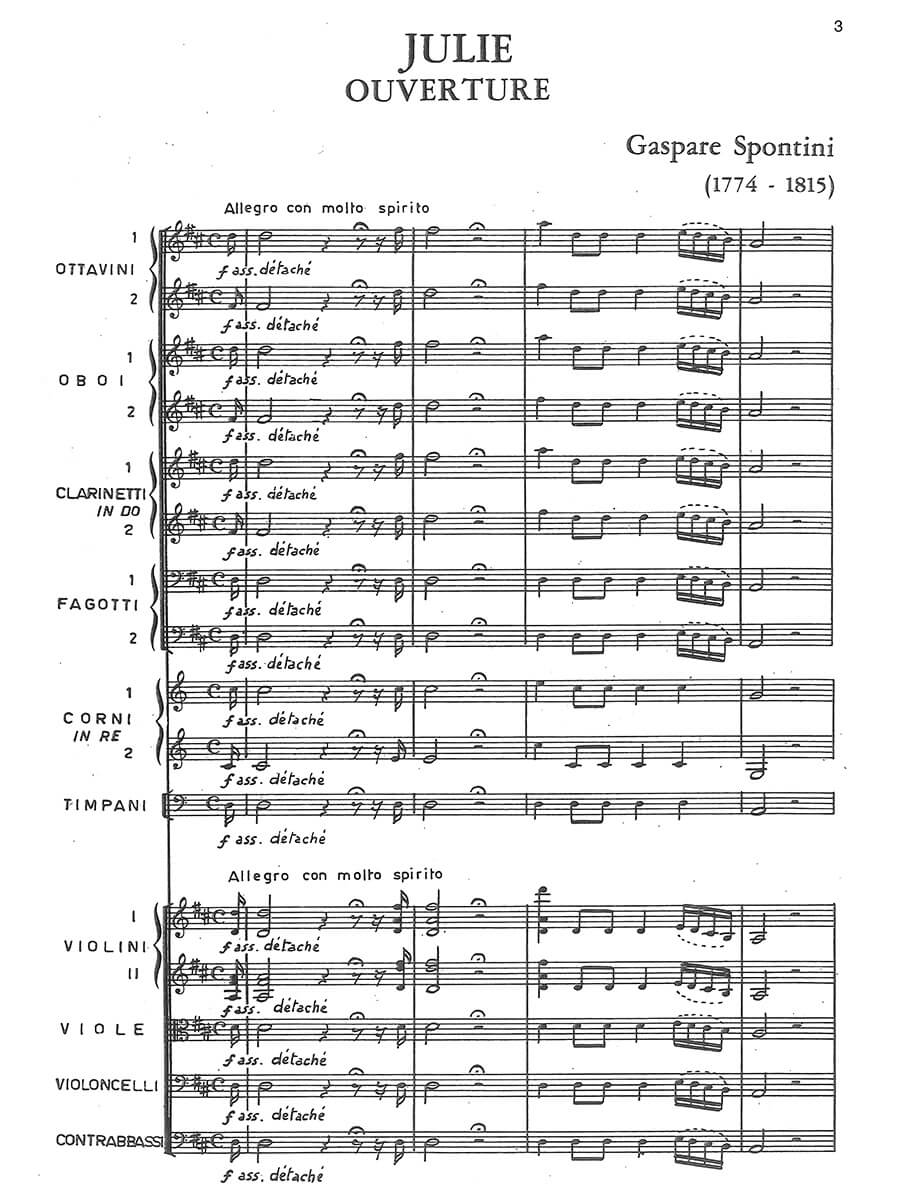Julie, overture
Spontini, Gaspare
16,00 €
Preface
Gaspare Spontini – Julie
Overture (March 12, 1805)
(b. Maiolati, November 14, 1774; d. Maiolati, January 24, 1851)
Preface
Largely forgotten outside of his own century, Italian-born composer Gaspare Spontini gained prominence throughout Europe with a series of successful French operas. Indeed, Spontini’s popular operas and dominating musical presence within the first half of the nineteenth century proved a significant force within the subsequent music of continental Europe. In the book Les Soirées de l’Orchestre (1852), Hector Berlioz noted his “immediate admiration for [Spontini’s] genius” and its “radiant ascension into the artistic heavens.” Berlioz was not alone in his admiration, however. Richard Wagner wrote of his “particular devotion” for Spontini, “the singular master”, whose command of text, music, and spectacle is a precursor to Wagner’s own theories of Gesamtkunstwerk. Moreover, his influence is heard in the operas of Carl Maria von Weber and Giacomo Meyerbeer, and in the songs of Franz Schubert, a noted admirer of French opera and, specifically, Spontini’s La Vestale (1807). Though generally omitted from the operatic canon, Spontini’s more successful works were influential to both the development of early-nineteenth-century Romantic opera and the generation of composers that followed.
Despite his position in the court of Ferdinand IV in Palermo and well-received comic operas for the Italian stage, Spontini’s international success began in Paris. Having relocated from Naples in 1803, Spontini arrived in Paris amidst a time of drastic structural changes for French opera. Bolstered by newly relaxed economic retraints and increased public support of the arts following the revolution, opera thrived in Paris, the center of growing bourgeois consumption. Rather than the state-controlled opera houses and exclusively nationalistic programing of the Bourbon monarchy, Paris saw an influx of new repertoire, both domestic and Italian. In 1801, English author and journalist Francis William Blagdon commented that the new bourgeois government had “effected a musical revolution, at which all persons of taste must rejoice, by introducing on [the] stage the harmonic riches of Italy.” Napoleon Bonaparte himself was a noted admirer of Italian opera and, following the conquer of Naples, installed Giovanni Paisiello as his maître de chapelle. In doing so, Bonaparte sought to utilize this new operatic multiplicity to unify the growing republic and wrote that of “all the fine arts, music is the one which exercises the greatest influence upon the passions, and is the one which the legislator should most encourage.” As many as twenty-five competitive opera companies proliferated in Paris during Bonaparte’s tenure as Premier consul and early reign as Empereur. Of these, the most prestigious were the Théâtre-Italien, the Opéra-Comique, and the eminent Académie Royale de Musique (known colloquially as the Opéra), a company that staged an impressive sixty-five original productions between 1800 and 1815.
Read full preface > HERE
Score Data
| Edition | Repertoire Explorer |
|---|---|
| Genre | Orchestra |
| Size | 210 x 297 mm |
| Printing | Reprint |
| Pages | 36 |
